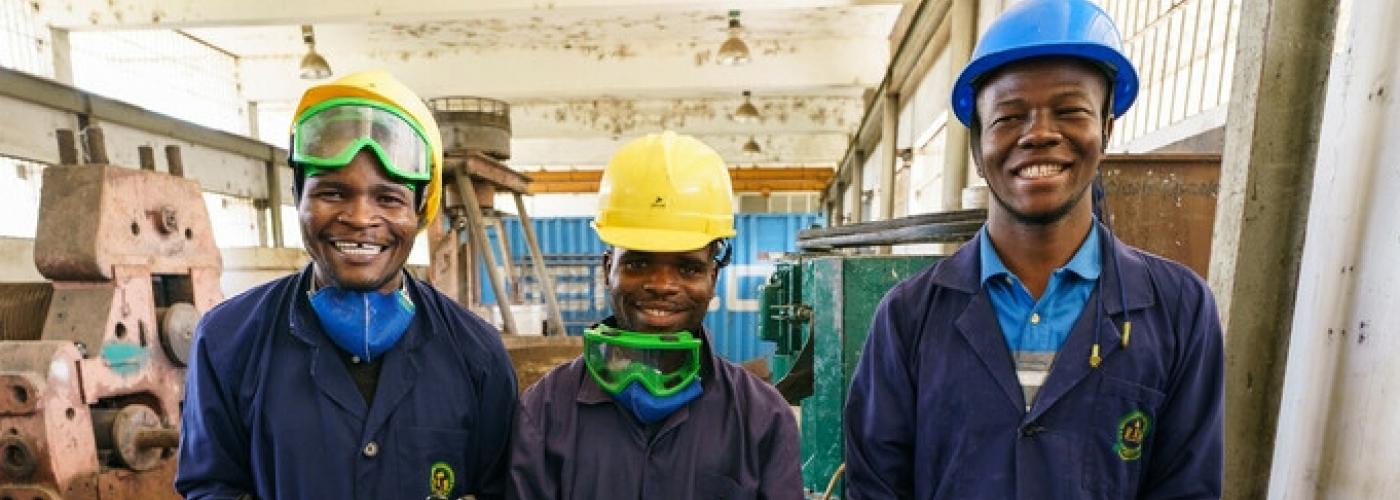5 Myths about Youth and Employment
Image

Over 67 million youth are unemployed globally and the majority live in rural areas with limited economic opportunities. The fallout of the COVID-19 pandemic has overwhelmingly impacted youth whose employment fell by more than twice that of adults in 2020.
Recognizing that livelihood creation for these young people will depend heavily on the agriculture sector, Lutheran World Relief’s approach to youth engagement follows USAID Positive Youth Development Framework and strives to prepare young people living in rural poverty for viable careers in agriculture.
With public-private partnerships, we advance economic and entrepreneurial opportunities for youth that support community resilience. In honor of International Youth Day, we want to dispel the myths that perpetuate harmful stereotypes around youth employment:
Myth 1: Youth do not work hard
Youth are too often perceived as difficult hires who lack reliability and drive. However, youth leaving the agricultural sector are far from uncommitted. Instead, they have grown up watching previous generations struggle to survive on income from farming. Investment in youth that prioritizes technological advances, sustainable practices and value chain strengthening leads to economic opportunities. Motivated youth are quick, adaptable learners who bring groundbreaking ideas and long-term commitment to the work that they do.
Snapshot: Through Lutheran World Relief’s Strengthening the Competitiveness of Small-scale Cocoa Producers project in Guatemala, we trained youth to become valuable extension agents for fellow farmers and small business entrepreneurs with skills in agri-business management, governance and administration.
Myth 2: Youth lack entrepreneurial skills
Youth unemployment and underemployment is highest in low- and middle-income countries where job creation does not move fast enough to absorb the growing workforce. Fostering youth entrepreneurship and self-employment is an important vehicle not only for economic growth and livelihoods strengthening, but also for building human dignity. Youth are incubators of new ideas and technical skills. When equipped to navigate the local social system, market dynamics and regulatory environment, youth have enormous potential for entrepreneurial success.
Snapshot: Lutheran World Relief's Sustainable Enterprises for Equitable Development (SEED) project in Uganda trained youth to become village enterprise agents. Under SEED, we connected youth village enterprise agents and agro-input suppliers, supported youth in creating market linkages, facilitated access to finance, and trained the agents in entrepreneurship, business planning, safe chemical use and business management.
Myth 3: Traditional education and training programs are enough to ensure youth will get a job
Educational and vocational institutions do not inherently create employment. Traditional education systems and training programs, often plagued by outdated curricula and quality issues, have done little to resolve the frequent mismatch between the skills recent graduates possess and those required by employers in today’s rapidly evolving global economy. Educators and firms should mentor future business leaders while encouraging self-employment and micro-enterprises. Public and private partnerships should invest in youth capacities around leadership, entrepreneurship, market systems development approaches, financial management and marketing. By valuing inter-generational collaboration and horizontal knowledge transfer as well as formal internships and expanded curriculums, youth employment can grow.
Snapshot: Lutheran World Relief's Investing in New Ventures of Entrepreneurial Students in Tanzania (INVEST) project revised Tanzania’s Ministry of Agriculture Training Institutes (MATIs) curriculum based on labor market needs and provided in-depth teacher training; created an innovation challenge fund to award startup capital to students with entrepreneurial ideas; and formalized public-private sector partnerships into an internship program to further practical learning, leading to better employment and entrepreneurial outcomes for Tanzanian youth.
Myth 4: Youth do not have the ability to lead
Youth activists, such as Vanessa Nakate and Greta Thunberg, are proving to the world that youth are leaders with transformational ideas and profound passion. These role models, encouraged by peer-to-peer mentorship, can motivate other youth to lead. Consider how youth are critical change agents around gender equality in their communities. Youth are more likely to challenge restrictive and unequitable gender norms, change discriminatory beliefs and adopt new behaviors that value all gender identities. Youth are today’s changemakers.
Snapshot: In Nicaragua, Lutheran World Relief's Learning for Gender Integration (LGI) framework empowered a new generation of coffee cooperative leaders while strengthening young producers’ understanding of men’s and women’s changing roles in the agricultural sector.
Myth 5: Youth contributions to policy and programs are unnecessary
Youth are too often marginalized from policymaking as well as informal, community decision-making where entrenched hierarchies persist. Sustainable development can only be advanced by listening to young people and involving them in the process of developing solutions and advocating for their rights and needs. Youth-driven interventions shape future policy, improve community resiliency and drive innovation.
Snapshot: In response to youth feedback about lack of income between growing seasons in Lutheran World Relief's Youth in Sustainable Agriculture and Entrepreneurship Project in Indonesia, we responded by incorporating seasonal crop varieties into the project’s design to provide income throughout the calendar year while providing additional requested guidance on financial management.
Overcoming the Myths: Our Youth Engagement Approach
As we work to overcome these myths, youth access to reliable, sustainable means of employment and entrepreneurial opportunities is central to Lutheran World Relief’s work globally in communities struggling to raise a standard of living for their families. Understanding that small and medium enterprises (SMEs) are engines of job creation, we support young farmers and youth entrepreneurs on their farms and with their small businesses through education, technical assistance, small grants, and market access for their products and services. Whether youth are formally educated or informally educated, engaged in the public or private sector, our work will continue to champion youth diversity and advance all youth aspirations.
Cathy Phiri, Senior Technical Advisor for Market Systems, and Roselle Agner, Senior Technical Advisor for Gender, contributed to this blog.


